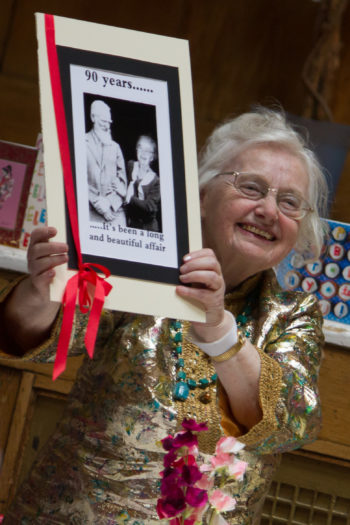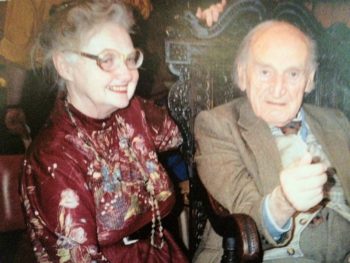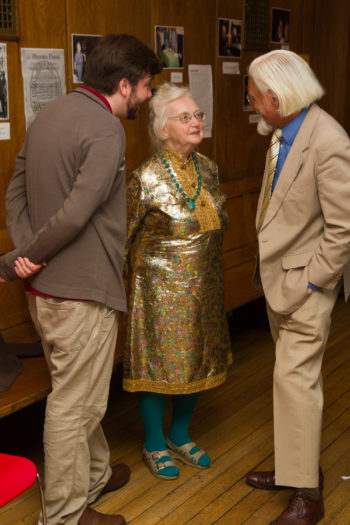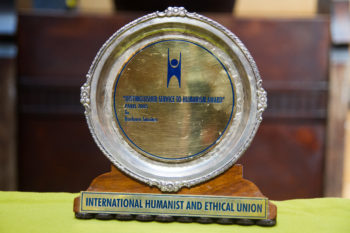
Humanists UK is deeply sad to learn of the death of one of its longest-standing members and most dedicated activists, Ms Barbara Smoker.
As well as authoring the children’s book Humanism, Barbara was an active member of Humanists UK over a period spanning eight decades. In that time, she was a leader in many organisations and causes, including as chair of the Voluntary Euthanasia Society (now Dignity in Dying), President of the National Secular Society, Vice Chair of Humanists UK, and founder and President of South East London Humanists.
Early life and the war
Born in 1923 to a conservative Catholic family in Catford in London, as a young girl Barbara found herself, in her own words, ‘torn between the ambitions of becoming a nun or a writer.’ She served in the Women’s Naval Service in Asia from 1942 to 1945, and like many at that time, her experience of war nursed deep doubts about her previously cherished beliefs, and she found that the more she read or thought about the subject at all, the less she believed. Stationed in Ceylon as a wireless telegraphist, her final act had been to put out the radio message which declared that war with Japan was over. Distraught that men were still dying at sea as a result of the lack of communication from home about the armistice, she fought with her commanding officer to get that message out sooner than planned. The experience promoted a hatred of war and an anti-establishment streak in her personality that would never let up.
She returned home soon after the war, bringing growing religious doubts with her, and was soon kicked out of the house when her mother realised she stopped attending mass. This propelled her into the long life of activism that was to follow. She found herself initially drawn to the writings of the humanist Hector Hawton, who like her had come from a Catholic background and was fascinated by some of the same moral and ethical dilemmas she had meditated on privately during the war. It was to serve as her introduction to the humanist movement and, intensified by her love of reading, opened her to a world of new and exciting ideas – empowering ones. By age 26, Barbara saw herself as a convinced atheist and was keen to advance the ideals of humanism and explore for herself some of the ideas presented in Hawton’s lectures. She herself reflected that the moment she realised that her faith was gone, and that a new world of books and humanist ideas was open to her, was ‘like an orgasm’.
As a young woman, in her own words, Barbara ‘survived on her wits’. She would enter and win a literary competition every week in order to get by and then ‘make a bit extra on the horses’. When literary output or gambling didn’t sustain her, she took odd jobs, temping for various companies around London – mostly secretarial work. This left her with ample remaining time for her passion projects, which increasingly revolved around the humanist movement and the various liberal campaigning organisations that made up the movement in the mid to late 20th century. Academically gifted, she also ‘made a fair amount of money transcribing Bernard Shaw’s shorthand for scholars’, as well as through occasional forays into journalism and other fields that took her fancy.
Decades of humanist activism

Barbara’s first involvement with organised humanism came through Harold Blackham, the Secretary of the Ethical Union (as Humanists UK was then known) who was a regular lecturer at the West London Ethical Society. Whenever Blackham’s lectures were advertised in the New Statesman in the 1950s, Barbara would travel across London to Bayswater to hear him speak. She said at the time, ‘He had a quiet sense of humour and occasionally a witty turn of phrase. I thought he looked very much like John Stuart Mill, and he was a charismatic speaker, though not an easy one.’ She remarked to a friend that she found him charming and erudite, and that ‘all the women were in love with him!’
Over repeated engagements with the Ethical Union, Barbara grew close to Blackham and developed a life-long friendship with him. She began volunteering for the organisation and in 1957 was one of the principal organisers for the second ever World Humanist Congress, to take place in London. The first conference had seen the foundation of Humanists International five years previously in Amsterdam, and so the follow-up event was expected to be an even bigger gathering of humanists from around the world, and there was pressure on British humanists to put on a show which competed with the Dutch event. Based in the Humanists UK offices (then in Kensington), she then worked closely with what she called the ‘three Bs’ (Harold Blackham, Lindsay Burnet, and Ashton Burall – the last of whom ran the Progressive League, another contemporary humanist campaigning group) for many years.
As well as kindling humanist instincts into a full-roaring fire of activism, the war had changed Barbara in other ways, creating a longing in her for a world at peace. In the humanist movement she met many like-minded anti-war activists, including Bertrand Russell, whose Committee of 100 she was eager to be a part of and support.

Through her involvement in organised humanism, Barbara became intellectually and morally stimulated as never before and discovered what seemed to onlookers like a limitless source of enthusiasm and energy. She soon held leadership roles in a number of causes, including as Secretary of the Shaw Society; Secretary of the Phonetic Alphabet Association; cataloguer to the library of the inventor Isaac Pitman; part of the Institute for the Study and Treatment of Delinquency (now the Centre for Crime and Justice Studies); the National Council for Civil Liberties (now Liberty); President of the National Secular Society for 25 years; Vice President of the Gay and Lesbian Humanist Association (later LGBT Humanists); founder, chair, and later Honorary President of South East London Humanists; President of Bromley Humanists; committee member of the Lewisham Campaign for Nuclear Disarmament; appointed lecturer of the Conway Hall Ethical Society; and chair of Dignity in Dying from 1981-1985. When the latter organisation changed policy to no longer support assisted dying for the incurably suffering, she transferred her support to what is now My Death, My Decision.
She was one of the National Secular Society’s longest serving Presidents – beaten only by one of her predecessors, Chapman Cohen. In that time she led the organisation’s work on the many issues that animated her, including faith schools. When asked by The Oldie in 2013 whether she thought the world had become better or worse, she was clear that it had improved, especially for women. But she remarked that the one exception to the trend was the revival of faith schools, which the government had begun investing in during the 2000s, reversing much progress made towards a universal education system.
These were just a few of the causes she was formally attached to. Others included various anti-war protests, campaigns to end homelessness, work for abolition of the death penalty, and, allegedly, financing of the very popular ‘Make Love, Not War’ badges that were widely sold in the 1960s. Her life story is well told in her annual letters to friends and colleagues and by the diaries of those she knew in her work. In 1985, she helped move along a fairly staid debate on stem cell research – bogged down by religious concerns that bore no relation to reality as described by science – by writing and distributing to every MP her own pamphlet on the subject, Eggs Are Not People. She was also a passionate campaigner for animal rights and against vivisection.
Her largest contribution to humanism is most likely her authoritative book on the subject, pitched at teenagers and titled simply Humanism, first published in 1973 and still in print today. She counted the book among her proudest achievements and it was widely cited in school syllabuses around the country, shaping a generation’s understanding of what it meant to be a humanist. There is no shortage of stories of her role in the movement, or, indeed, of the funerals, weddings, and namings she officiated in her capacity as a humanist celebrant, or of the celebrants she trained in her capacity as trainer. In 1977, she joined the campaign to defend Gay News when it was sued for blasphemy by Mary Whitehouse. She made waves in 1985 with her BBC World Service essay ‘Why I Am An Atheist’ and became a regular contributor to radio discussions on humanism, religion, and ethics in the 1980s.
Never afraid of controversy, in 1989, she placed herself at the front of the crowds looking on at the procession of young Muslim men whipped up into anger by the fatwa against Salman Rushdie. She held up a large banner saying simply ‘Free Speech’ and was set upon by the surging crowd. In 2002, she attracted media publicity when she threatened the BBC with legal action over the continued discrimination against humanists on Thought for the Day; her local humanist group in South East London continues be very active campaiging on that issue.
Barbara nevertheless expressed disappointment that she never, as she saw it anyway, fulfilled her childhood ambitions as a writer, and regretted that she never wrote ‘a great poem’. She did however write one satirical book of verse, entitled Good God! and her collected articles for The Freethinker magazine were published in 2002. As an editor, she published the collected sayings of Harold Blackham, published as Blackham’s Best in 1987, and his volume The Future of our Past. Her own memoirs were published in 2018 as My Godforsaken Life.
A legacy

In recognition of all the above and more, in 2005, Barbara was awarded the Distinguished Service to Humanism Award at the Humanists International general assembly in Paris – nearly fifty years on from the conference she had organised, and which helped to establish that organisation on solid ground.
When her friend Harry Stopes-Roe died in 2014, Barbara became the last appointed lecturer of Conway Hall Ethical Society – and among the last of a generation of humanists whose collective activism had forever changed the society we live in. Her friends sometimes joked it seemed doubtful that she would ever die at all. She had, after all, survived such things as a bout of scarlet fever; amoebic dysentery; treatment for the latter involving lethal doses of arsenic; accidentally burning her own house to the ground; and being run over by a car on at least two occasions. She died after a battle with cancer.
Barabra did not fear death and made it clear all her life that she would rather die than deteriorate slowly. She once remarked in an interview,
‘[Death] doesn’t worry me and I’ve always thought about it. If I get no worse than I am now then I am happy to go on living. If I follow the same pattern [as my mother] then I shan’t. I support [My Death, My Decision]. It’s fear of death which is the main reason for becoming religious. They want an afterlife!’
Just as she did not fear death, she did not have time for religious notions of the afterlife, saying ‘It would be terrible… an eternity in heaven – that would be hell.’
In an interview for The Oldie in 2013, she gave these words of advice:
‘Don’t always be obedient. Obedience if overrated. You’ve got to work out your morality for yourself, not do everything you’re told. Obedience can be more of a vice than a virtue.’
Humanists UK Chief Executive and President of Humanists International Andrew Copson said:
‘Barbara was a fearless campaigner whose life story should inspire us all today. She led a long and exuberant life of activism, and was never afraid to ruffle feathers as she worked for what she saw as positive changes in our society. To the very end, she was someone who kept me on my toes and could be counted on to give frank and honest advice, and I will miss her letters and emails and regular questions at our AGM.
‘I know she’d be the first to agree that humanism and society at large owe her an enormous debt of thanks. We at Humanists UK like many others will be telling stories about her life and the remarkable things she did for years to come. She was one of a generation of iconoclastic and progressive activists that will never be forgotten.’
Notes:
For more information or comment, please contact Andrew Copson at chiefexec@humansim.org.uk or Karen Wright at karen@humanists.uk.
Humanists UK is the national charity working on behalf of non-religious people. Powered by over 85,000 members and supporters, we advance free thinking and promote humanism to create a tolerant society where rational thinking and kindness prevail. We provide ceremonies, pastoral care, education, and support services benefitting over a million people every year and our campaigns advance humanist thinking on ethical issues, human rights, and equal treatment for all.
